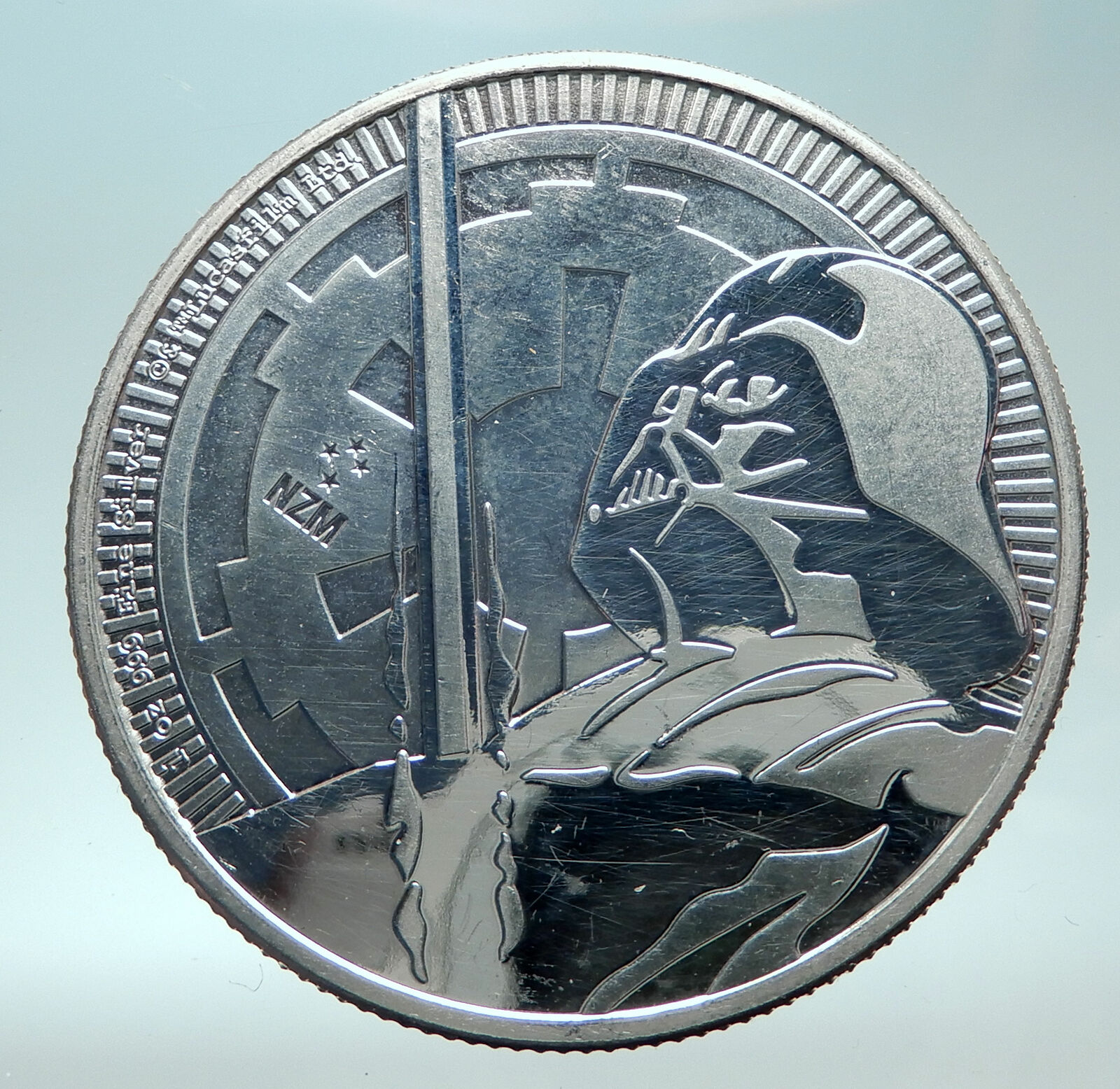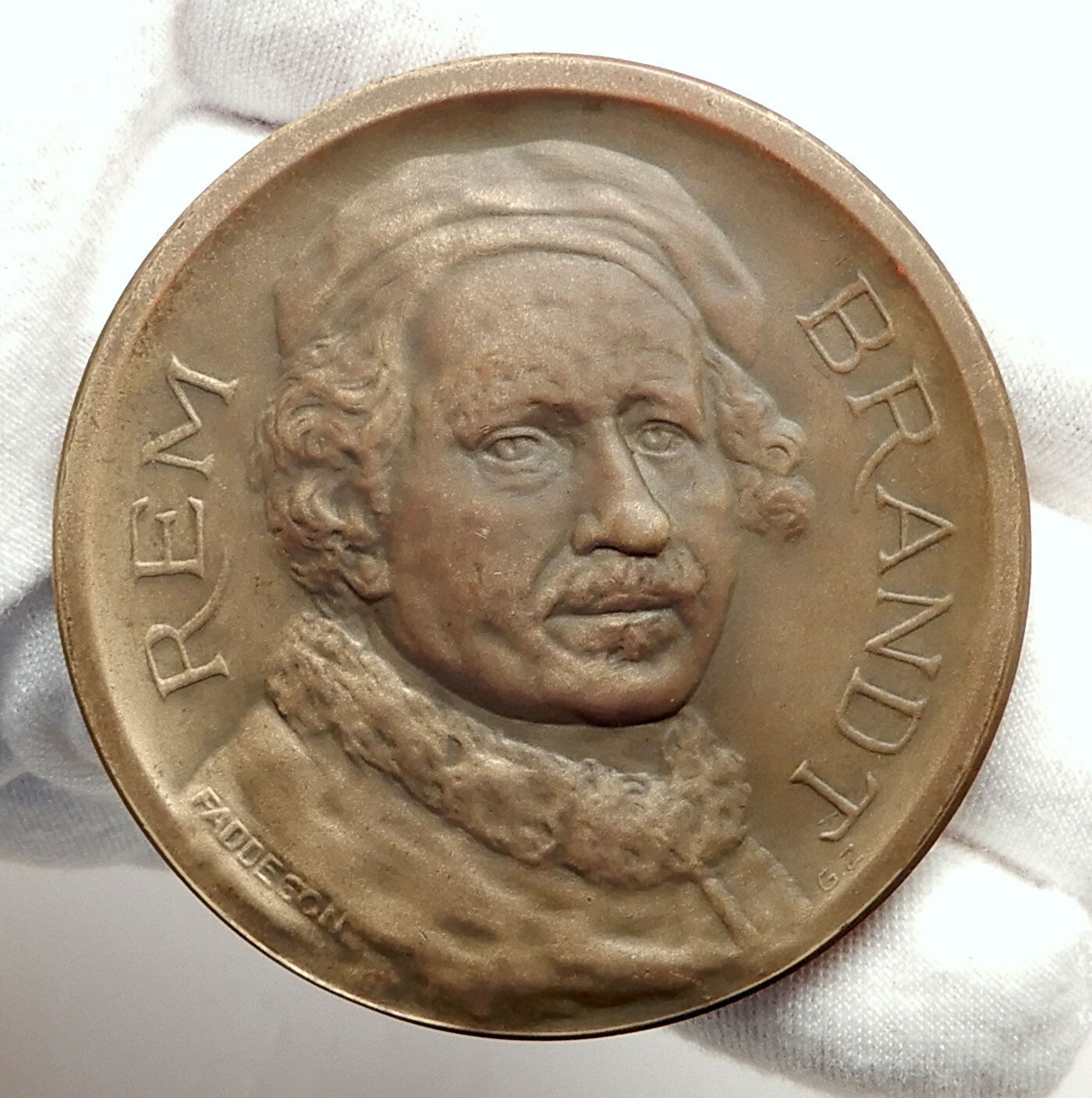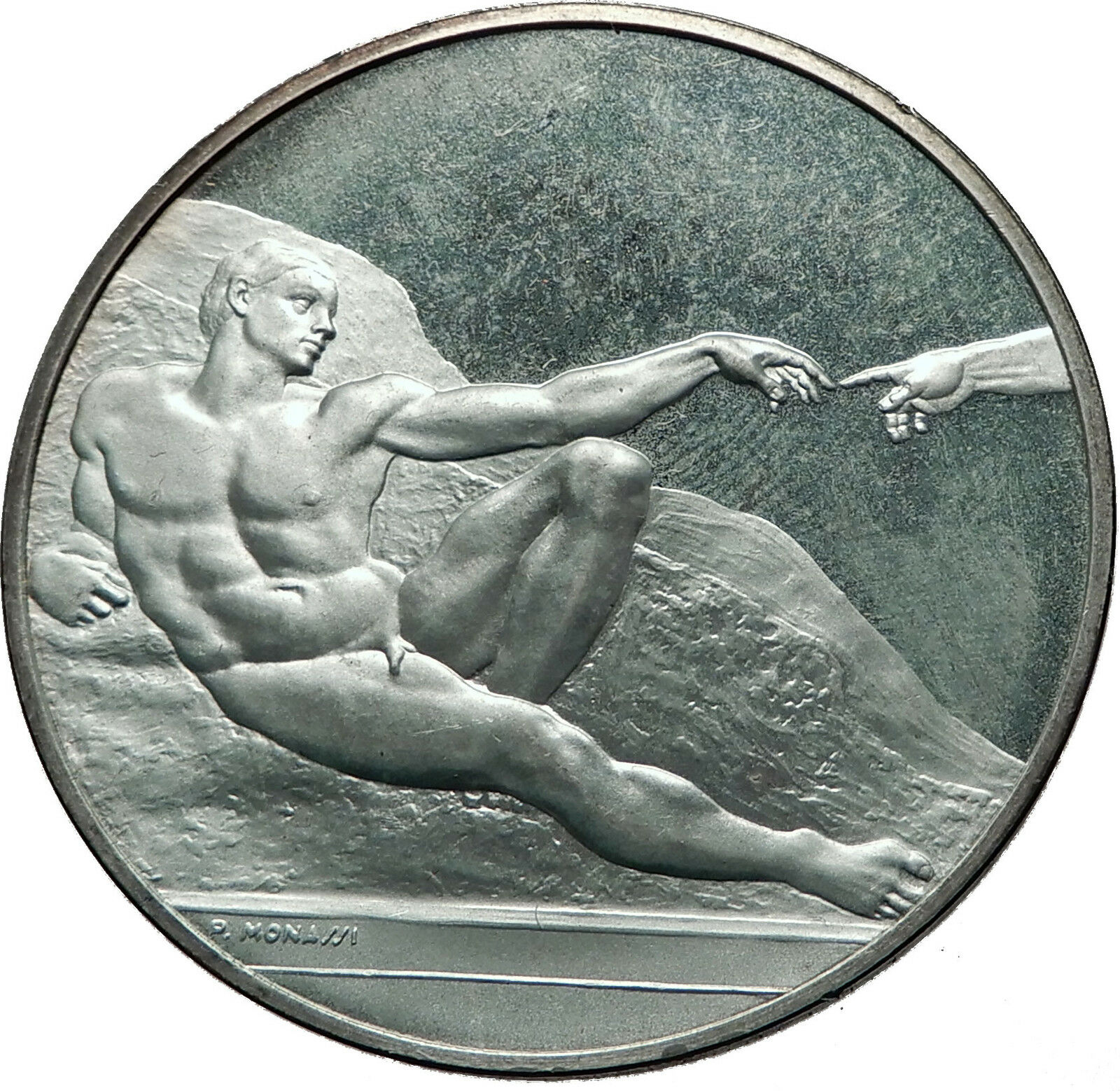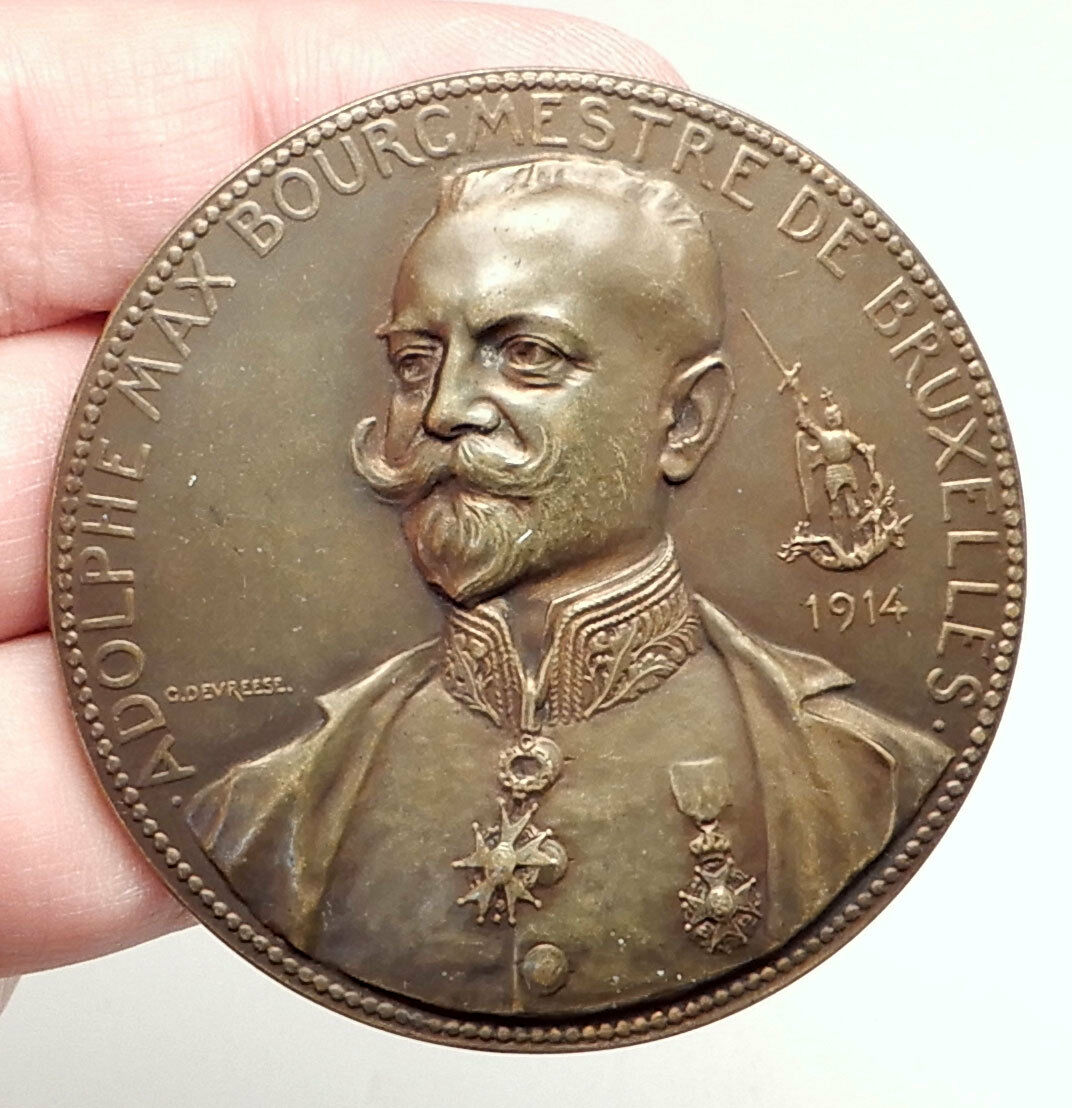|
Saudi Arabia
King Faisal bin Abdulaziz Al Saud – King: 2 November 1964 – 25 March 1975
1975 (AH 1395) Proof Silver Medal 50mm (59.80 grams) 0.925 Silver
Reference: N# 118486
رائد التضامن الإسلامي ١٣٢٤هـ ١٣٩٥هـ الملك فيصل بن عبد العزيز آل سعود, Bust of King Faisal Bin Abdulaziz Al-Saud facing right in prayer.
CHI 925, Al-Masjid Al-Haram (The Sacred Mosque)
You are bidding on the exact item pictured, provided with a Certificate of Authenticity and Lifetime Guarantee of Authenticity.
 Faisal bin Abdulaziz Al Saud (14 April 1906 – 25 March 1975) was a Saudi Arabian statesman and diplomat who was King of Saudi Arabia from 2 November 1964 until his assassination in 1975. Prior to his ascension, he served as Crown Prince of Saudi Arabia from 9 November 1953 to 2 November 1964, and he was briefly regent to his half-brother King Saud in 1964. He was the third son of King Abdulaziz, the founder of modern Saudi Arabia, and the second of Abdulaziz’s six sons who were kings. Faisal bin Abdulaziz Al Saud (14 April 1906 – 25 March 1975) was a Saudi Arabian statesman and diplomat who was King of Saudi Arabia from 2 November 1964 until his assassination in 1975. Prior to his ascension, he served as Crown Prince of Saudi Arabia from 9 November 1953 to 2 November 1964, and he was briefly regent to his half-brother King Saud in 1964. He was the third son of King Abdulaziz, the founder of modern Saudi Arabia, and the second of Abdulaziz’s six sons who were kings.
Faisal was the son of Abdulaziz and Tarfa bint Abdullah Al Sheikh. His father was still reigning as Emir of Nejd at the time of Faisal’s birth, and his mother was from the Al ash-Sheikh family which has produced many prominent Saudi religious leaders. Faisal emerged as an influential royal politician during his father’s reign. He served as viceroy of Hejaz from 1926 to 1932. He was the Saudi foreign minister from 1930 and prime minister from 1954 until his death, except for a two-year break in both positions from 1960 to 1962. After his father died in 1953 and his half-brother Saud became king, Faisal became crown prince, and in that position he outlawed slavery in Saudi Arabia. He persuaded King Saud to abdicate in his favour in 1964 with the help of other members of the royal family and his first cousin Muhammad ibn Ibrahim Al ash-Sheikh, Grand Mufti of Saudi Arabia.
Faisal implemented a policy of modernization and reform. His main foreign policy themes were pan-Islamism, anti-communism, and pro-Palestinianism. He attempted to limit the power of Islamic religious officials. Protesting against support that Israel received from the West, he led the oil embargo which caused the 1973 oil crisis. Faisal successfully stabilized the kingdom’s bureaucracy, and his reign had significant popularity among Saudi Arabians despite his reforms facing some controversy. In 1975, he was assassinated by his nephew Faisal bin Musaid. King Faisal was succeeded by his half-brother Khalid bin Abdulaziz.
 Saudi Arabia, officially the Kingdom of Saudi Arabia (KSA), is a sovereign Arab state in Western Asia constituting the bulk of the Arabian Peninsula. With a land area of approximately 2,150,000 km2 (830,000 sq mi), Saudi Arabia is geographically the fifth-largest state in Asia and second-largest state in the Arab world after Algeria. Saudi Arabia is bordered by Jordan and Iraq to the north, Kuwait to the northeast, Qatar, Bahrain and the United Arab Emirates to the east, Oman to the southeast and Yemen to the south. It is separated from Israel and Egypt by the Gulf of Aqaba. It is the only nation with both a Red Sea coast and a Persian Gulf coast and most of its terrain consists of arid desert droughts and mountains. Saudi Arabia, officially the Kingdom of Saudi Arabia (KSA), is a sovereign Arab state in Western Asia constituting the bulk of the Arabian Peninsula. With a land area of approximately 2,150,000 km2 (830,000 sq mi), Saudi Arabia is geographically the fifth-largest state in Asia and second-largest state in the Arab world after Algeria. Saudi Arabia is bordered by Jordan and Iraq to the north, Kuwait to the northeast, Qatar, Bahrain and the United Arab Emirates to the east, Oman to the southeast and Yemen to the south. It is separated from Israel and Egypt by the Gulf of Aqaba. It is the only nation with both a Red Sea coast and a Persian Gulf coast and most of its terrain consists of arid desert droughts and mountains.

The area of modern-day Saudi Arabia formerly consisted of four distinct regions: Hejaz, Najd and parts of Eastern Arabia (Al-Ahsa) and Southern Arabia (‘Asir). The Kingdom of Saudi Arabia was founded in 1932 by Ibn Saud. He united the four regions into a single state through a series of conquests beginning in 1902 with the capture of Riyadh, the ancestral home of his family, the House of Saud. Saudi Arabia has since been an absolute monarchy, effectively a hereditary dictatorship governed along Islamic lines. The ultraconservative Wahhabi religious movement within Sunni Islam has been called “the predominant feature of Saudi culture”, with its global spread largely financed by the oil and gas trade. Saudi Arabia is sometimes called “the Land of the Two Holy Mosques” in reference to Al-Masjid al-Haram (in Mecca) and Al-Masjid an-Nabawi (in Medina), the two holiest places in Islam. As of 2013, the state had a total population of 28.7 million, of which 20 million were Saudi nationals and 8 million were foreigners. As of 2017, the population is 33 million. The state’s official language is Arabic.
.svg/250px-Saudi_Arabia_(orthographic_projection).svg.png) Petroleum was discovered on 3 March 1938 and followed up by several other finds in the Eastern Province. Saudi Arabia has since become the world’s largest oil producer and exporter, controlling the world’s second largest oil reserves and the sixth largest gas reserves. The kingdom is categorized as a World Bank high-income economy with a high Human Development Index and is the only Arab country to be part of the G-20 major economies. However, the economy of Saudi Arabia is the least diversified in the Gulf Cooperation Council, lacking any significant service or production sector (apart from the extraction of resources). The state has attracted criticism for its treatment of women and use of capital punishment. Saudi Arabia is a monarchical autocracy, has the fourth highest military expenditure in the world and SIPRI found that Saudi Arabia was the world’s second largest arms importer in 2010-2014. Saudi Arabia is considered a regional and middle power. In addition to the GCC, it is an active member of the Organisation of Islamic Cooperation and OPEC. Petroleum was discovered on 3 March 1938 and followed up by several other finds in the Eastern Province. Saudi Arabia has since become the world’s largest oil producer and exporter, controlling the world’s second largest oil reserves and the sixth largest gas reserves. The kingdom is categorized as a World Bank high-income economy with a high Human Development Index and is the only Arab country to be part of the G-20 major economies. However, the economy of Saudi Arabia is the least diversified in the Gulf Cooperation Council, lacking any significant service or production sector (apart from the extraction of resources). The state has attracted criticism for its treatment of women and use of capital punishment. Saudi Arabia is a monarchical autocracy, has the fourth highest military expenditure in the world and SIPRI found that Saudi Arabia was the world’s second largest arms importer in 2010-2014. Saudi Arabia is considered a regional and middle power. In addition to the GCC, it is an active member of the Organisation of Islamic Cooperation and OPEC.
|





 Faisal bin Abdulaziz Al Saud (14 April 1906 – 25 March 1975) was a Saudi Arabian statesman and diplomat who was King of Saudi Arabia from 2 November 1964 until his assassination in 1975. Prior to his ascension, he served as Crown Prince of Saudi Arabia from 9 November 1953 to 2 November 1964, and he was briefly regent to his half-brother King Saud in 1964. He was the third son of King Abdulaziz, the founder of modern Saudi Arabia, and the second of Abdulaziz’s six sons who were kings.
Faisal bin Abdulaziz Al Saud (14 April 1906 – 25 March 1975) was a Saudi Arabian statesman and diplomat who was King of Saudi Arabia from 2 November 1964 until his assassination in 1975. Prior to his ascension, he served as Crown Prince of Saudi Arabia from 9 November 1953 to 2 November 1964, and he was briefly regent to his half-brother King Saud in 1964. He was the third son of King Abdulaziz, the founder of modern Saudi Arabia, and the second of Abdulaziz’s six sons who were kings. Saudi Arabia, officially the Kingdom of Saudi Arabia (KSA), is a sovereign Arab state in Western Asia constituting the bulk of the Arabian Peninsula. With a land area of approximately 2,150,000 km2 (830,000 sq mi), Saudi Arabia is geographically the fifth-largest state in Asia and second-largest state in the Arab world after Algeria. Saudi Arabia is bordered by Jordan and Iraq to the north, Kuwait to the northeast, Qatar, Bahrain and the United Arab Emirates to the east, Oman to the southeast and Yemen to the south. It is separated from Israel and Egypt by the Gulf of Aqaba. It is the only nation with both a Red Sea coast and a Persian Gulf coast and most of its terrain consists of arid desert droughts and mountains.
Saudi Arabia, officially the Kingdom of Saudi Arabia (KSA), is a sovereign Arab state in Western Asia constituting the bulk of the Arabian Peninsula. With a land area of approximately 2,150,000 km2 (830,000 sq mi), Saudi Arabia is geographically the fifth-largest state in Asia and second-largest state in the Arab world after Algeria. Saudi Arabia is bordered by Jordan and Iraq to the north, Kuwait to the northeast, Qatar, Bahrain and the United Arab Emirates to the east, Oman to the southeast and Yemen to the south. It is separated from Israel and Egypt by the Gulf of Aqaba. It is the only nation with both a Red Sea coast and a Persian Gulf coast and most of its terrain consists of arid desert droughts and mountains. 
.svg/250px-Saudi_Arabia_(orthographic_projection).svg.png) Petroleum was discovered on 3 March 1938 and followed up by several other finds in the Eastern Province. Saudi Arabia has since become the world’s largest oil producer and exporter, controlling the world’s second largest oil reserves and the sixth largest gas reserves. The kingdom is categorized as a World Bank high-income economy with a high Human Development Index and is the only Arab country to be part of the G-20 major economies. However, the economy of Saudi Arabia is the least diversified in the Gulf Cooperation Council, lacking any significant service or production sector (apart from the extraction of resources). The state has attracted criticism for its treatment of women and use of capital punishment. Saudi Arabia is a monarchical autocracy, has the fourth highest military expenditure in the world and SIPRI found that Saudi Arabia was the world’s second largest arms importer in 2010-2014. Saudi Arabia is considered a regional and middle power. In addition to the GCC, it is an active member of the Organisation of Islamic Cooperation and OPEC.
Petroleum was discovered on 3 March 1938 and followed up by several other finds in the Eastern Province. Saudi Arabia has since become the world’s largest oil producer and exporter, controlling the world’s second largest oil reserves and the sixth largest gas reserves. The kingdom is categorized as a World Bank high-income economy with a high Human Development Index and is the only Arab country to be part of the G-20 major economies. However, the economy of Saudi Arabia is the least diversified in the Gulf Cooperation Council, lacking any significant service or production sector (apart from the extraction of resources). The state has attracted criticism for its treatment of women and use of capital punishment. Saudi Arabia is a monarchical autocracy, has the fourth highest military expenditure in the world and SIPRI found that Saudi Arabia was the world’s second largest arms importer in 2010-2014. Saudi Arabia is considered a regional and middle power. In addition to the GCC, it is an active member of the Organisation of Islamic Cooperation and OPEC. 




